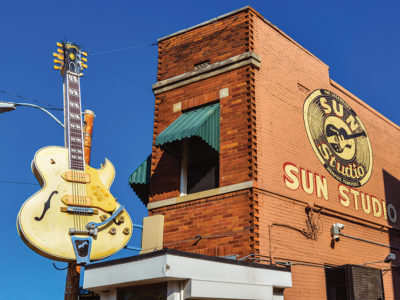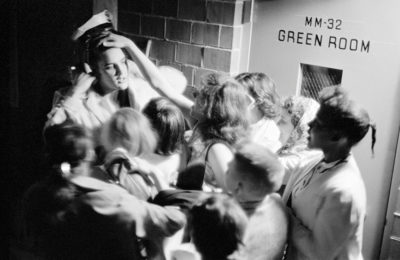When Elvis Flopped in Vegas
In a town addicted to building things, blowing them up, and then building them all over again, the New Frontier Hotel in 1955 was a fine example of Las Vegas progress. It was originally built in 1942 and called the Last Frontier, the second resort to open on what would become known as the Las Vegas Strip. Like its predecessor, El Rancho Vegas, the Last Frontier was a luxury resort in old Western garb — “The Early West in Modern Splendor,” as its promotional slogan put it.
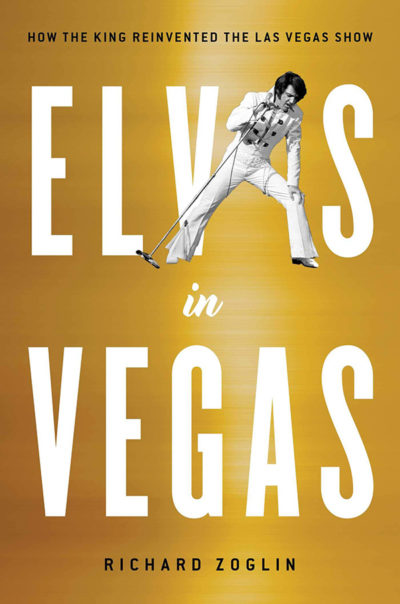
But as ever more modern and luxurious hotels opened along the Strip, the Last Frontier decided it was time for an update, and in early 1955 the hotel closed down, gave itself a makeover, and reopened as the New Frontier. The old Western-themed showroom was transformed into the spiffy new thousand-seat Venus Room, with five tiered rows of booths and an expansive stage, “with sides running to such length that the whole thing looks like a gigantic cinemascope screen,” in the words of one awed reporter.
The hotel’s grand reopening in April 1955 was something of a disaster. Mario Lanza, the internationally renowned opera singer and movie star, was booked as the opening headliner, but he suffered a meltdown before the show — an attack of stage fright compounded by drinking — and never set foot onstage. After an hour’s delay, the hotel announced that Lanza had laryngitis, and Jimmy Durante appeared as a last-minute replacement. (Too last-minute for Las Vegas Sun columnist Ralph Pearl, who filed his review early to make his deadline and raved about Lanza’s phantom performance. “Seldom in the history of this town,” he wrote, “has a star done a greater show or received a greater standing ovation.”)
One year later the New Frontier played host to the Las Vegas debut of another, very different performer. He was nervous, too, but he did show up — though many in the audience were probably mystified as to what he was doing there. On April 23, 1956, Elvis Presley came to town.
The 21-year-old rockabilly sensation from Memphis was in the midst of his phenomenal breakthrough year. Elvis Aron Presley recorded his first RCA single, “Heartbreak Hotel,” in January. By April he had the No. 1 record in America; his gyrating TV appearances, on Tommy Dorsey’s variety show and The Milton Berle Show, were the talk of the country; and Paramount Pictures had signed him to a movie contract.
“No check is any good,” said Elvis’s manager Colonel Tom Parker. “They’re testing an atom bomb out there in the desert. What if someone pushed the wrong button?”
Elvis appearing in Vegas was his manager Colonel Tom Parker’s idea, and not a very good one. Elvis’s frenetic rock ’n’ roll performances, which were causing such a sensation in the rest of the country, were hardly geared for a crowd of middle-aged Vegas showgoers. Yet there he was at the New Frontier, touted as “The Atomic-Powered Singer” (in a town where people could watch real atomic tests taking place in the Nevada desert nearby), the “extra added attraction” on a bill headed by Freddy Martin’s orchestra and comedian Shecky Greene. Elvis got paid $15,000 for the two-week gig, and the Colonel asked for it in cash. “No check is any good,” he said. “They’re testing an atom bomb out there in the desert. What if someone pushed the wrong button?”
The audience at the New Frontier must have thought someone had pushed the wrong button. Freddy Martin, whose “sweet music” orchestra was known for its pop versions of classics like Tchaikovsky’s Concerto in B-flat, opened the show with several of his instrumental hits and a medley of songs from the musical Oklahoma! Next came Shecky Greene, a Chicago-born comedian just gaining notoriety for his raucous Vegas lounge act. Elvis was the closing act. Backed by his three-piece rhythm group — guitarist Scotty Moore, bassist Bill Black, and drummer D.J. Fontana — Elvis performed four songs and was onstage for just 12 minutes. The response was polite at best. One high roller sitting at ringside, according to a witness, got up midway through the show, cried “What is all this yelling and noise?” and fled to the casino. The critics weren’t much kinder. “Elvis Presley, coming in on a wing of advance hoopla, doesn’t hit the mark here,” wrote Bill Willard in Variety. “The loud braying of the tunes which rocketed him to the big time is wearing, and the applause comes back edged with a polite sound. For the teenagers, he’s a whiz; for the average Vegas spender, a fizz.” Newsweek said the young rock ’n’ roller was “like a jug of corn liquor at a champagne party.”
For Elvis and his backup group, accustomed to the pandemonium they were causing in concerts across the country, the response was sobering. “For the first time in months we could hear ourselves when we played out of tune,” said Bill Black. “They weren’t my kind of audience,” Elvis would say later. “It was strictly an adult audience. The first night especially I was absolutely scared stiff.”
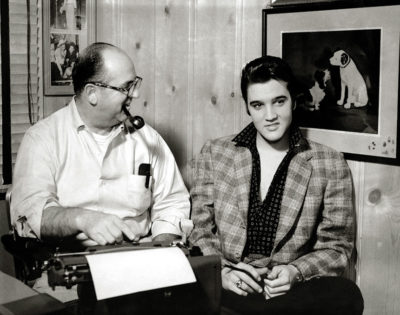
Shecky Greene got friendly with Elvis during the run and could see that the kid was out of his element — unable to relate to the audience and lacking the stage experience to win them over. He didn’t even dress right. “He came out in a dirty baseball jacket, just shit,” Greene recalled. “I went to Parker and I said, you can’t let him come out on the stage like that.” The Colonel apparently took Greene’s advice; for the rest of the engagement, Elvis and his band wore neat sport jackets, slacks, and bow ties. But after the first night, they no longer closed the show. Shecky Greene did.
By happy chance, a recording of Elvis’s 1956 Vegas show exists — taped by an audience member on the last night of the two-week engagement. Freddy Martin makes a polite, if rather patronizing, introduction, noting that it’s Elvis’s last performance: “We hate to see him go; he’s a fine young lad and a fine talent.” Elvis opens his set with “Heartbreak Hotel” — slower and bluesier than the recorded version, with Elvis playfully changing the lyric to “Heartburn Motel” in the last verse. His patter with the audience is disarmingly modest; Elvis is acutely aware that he’s a fish out of water. “We’ve got a few little songs we’d like to do for you,” he says at the outset, “in our style of singing — if you want to call it singing.” He alludes to the difficulties he’s been having in the engagement: “It’s really been a pleasure being in Las Vegas. We had a pretty hard time — uh, a pretty good time. …” He makes a few awkward, country-boy jokes, asking the orchestra at one point if they know his next song, “Get Out of the Stables, Grandma, You’re Too Old to Be Horsin’ Around.” After three more numbers — “Long Tall Sally,” “Blue Suede Shoes,” and “Money Honey” — it’s over.
Elvis’s only chance to connect with his real audience came on a special Saturday matinee, scheduled by the hotel expressly for the teenagers who weren’t allowed into the casino for the evening shows. For a $1 admission (the proceeds donated to a local Little League baseball program), the kids got a free soft drink and a chance to shower Elvis with the kind of screaming adulation he was getting almost everywhere but in Las Vegas.
“The carnage was terrific,” reported Bob Johnson in the Memphis Press-Scimitar. “They pushed and shoved to get into the 1,000-seat room and several hundred thwarted youngsters buzzed like angry hornets outside. After the show, bedlam! A laughing, shouting, idolatrous mob swarmed him; he fled to the insufficient sanctuary of his suite. The door wouldn’t hold them out. They got his shirt, shredded it. A triumphant girl seized a button, clutched it as though it were a diamond. A squadron of police had to be called in to clear the area.”
The door wouldn’t hold them out. They got his shirt, shredded it. A triumphant girl seized a button, clutched it as though it were a diamond.
A few of the old-timers in Vegas tried to get hip to the new music phenom. “This cat, Presley, is neat, well gassed and has the heart,” wrote Ed Jameson in a tongue-in-cheek column for the Las Vegas Sun titled “A Cat Talks Back.” “His vocal is real and he has yet to go for an open field. He is hep to the motion of sound with a retort that is tremendous. These squares who like to detract their imagined misvalues can only size a note creeping upstairs after dark. This cat can throw ’em downstairs or even out the window. He has it.”
Though it was a tough engagement for him, Elvis enjoyed Las Vegas. He didn’t gamble much, but he checked out other entertainers in town (among them Johnny Ray, the Four Aces, and Liberace), went to the movies, and rode the bumper cars at the Last Frontier Village next door. He kept company with Judy Spreckels, a sugarcane heiress from Los Angeles, and Vampira, the campy TV horror-show host who was appearing in Liberace’s show at the Riviera. An Elvis fan from Albuquerque, Nancy Kozikowski, was on a vacation in Las Vegas with her parents and ran into Elvis several times during her stay — in the hotel lobby, at the restaurant, and one afternoon when he was wandering alone at the Last Frontier Village. “He recognized me and was very nice,” she recalled. “We took pictures in the 25-cent picture booth together and alone. We also made a very funny talking record together. … Elvis was very nice, very gentle, a perfect gentleman.”
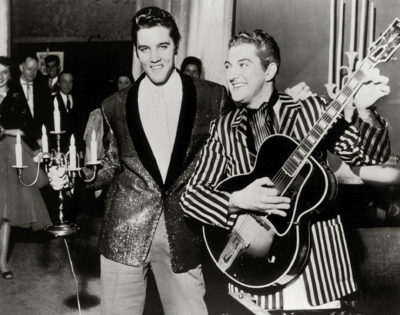
Elvis’s first visit to Las Vegas had one unexpected by-product. Among the lounge acts Elvis went to see was Freddie Bell and the Bellboys, a sextet from Philadelphia that did a kind of slicked-up, finger-snapping, nightclub-friendly version of early rock ’n’ roll. (The group had a bit role in the movie Rock Around the Clock, which had just opened in theaters.) One of the highlights of their show was an up-tempo version of “Hound Dog,” a blues number that had been a hit in 1953 for Willie Mae (“Big Mama”) Thornton. Elvis was so taken with Bell’s performance that he began doing the song in his own act and recorded it later that summer. “Hound Dog” became Elvis’s fastest-selling record yet, and his signature hit.
His 1956 Las Vegas engagement is regarded by most Elvis chroniclers as a rare misstep in a year of meteoric success, otherwise orchestrated to perfection by Colonel Parker, the onetime carny promoter and manager of country star Eddy Arnold who became Elvis’s manager and career guru early that year. The Colonel would later defend the booking, saying it gave Elvis a chance to reach a new audience and pointing out that the New Frontier couldn’t have been too disappointed, since the hotel asked him back for a return engagement.
Shecky Greene — who thought Elvis was a “wonderful kid” but turned down an offer from Colonel Parker to tour with Elvis as his opening act, finding the prospect faintly absurd — never quite understood what all the fuss was about. One day he ran into Bing Crosby, who was in Vegas during Elvis’s engagement. “What is the thing about this kid?” Shecky asked the elder statesman of American pop singing. “He’s a nice kid, but …”
“Shecky,” Bing replied, “he’ll be the biggest star in show business.”
Excerpted from Elvis in Vegas: How the King Reinvented the Las Vegas Show by Richard Zoglin. Copyright © 2019 by Richard Zoglin. Reprinted by permission of Simon & Schuster, Inc.
Featured image: ScreenProd / Photononstop / Alamy Stock Photo
News of the Week: The Sounds of Summer, Ghost Towns, and 10 Recipes (Yes, 10!) for Onion Rings
Beep! Crack! Vrooooom!

I don’t have air conditioning in my apartment, so in the summer I keep my windows open all the time. I live in a neighborhood with a lot of businesses and traffic, not far from both downtown and the highway. That means, unlike during fall and winter, every sound that happens outside, I hear in my apartment. I hear the big rig trucks as they go past my windows, the cars speeding through the intersection, the fire trucks, even people as they walk by and engage in conversation (something that can get rather boisterous on a Friday or Saturday night after they’ve had plenty of liquid refreshment). Oh, and a lot of car horns. Right this moment, there’s a guy in a Toyota in front of my building with his hand on the horn, impatient about something or someplace to go.
We always think of the differences in seasons only when it comes to weather (a crack of thunder almost made me jump out of my shoes a couple of nights ago), but what we hear is different too, and summer brings its own sounds, whether it’s a baseball meeting a baseball bat, the music of a Ferris wheel, or the march of a parade going by. I don’t mind the sound of any of those things, because unlike car horns, they’re associated with happy things. But all I can think about on this first full day of summer, the day when the kids are ecstatic and everyone’s thoughts turn to warm temps and shorts and barbecues, is that I can’t wait until the day a few months from now when I close my windows and everything gets a little quieter.
I could write about the smells of summer too, but I’d rather not think about those.
Hey, Let’s Buy a Town
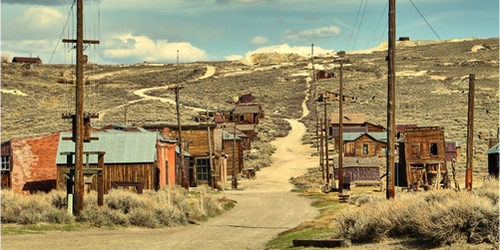
Do you have an extra $925,000? Have I got a ghost town for you.
Cerro Gordo, an abandoned mining town in California five hours north of Los Angeles, is for sale. It was founded in 1865 (the year Lincoln was assassinated) and was once the state’s largest producer of silver and lead.
You get 314 acres of land, plus 22 buildings, including a hotel, a saloon, and a chapel. You can shoot your own westerns there, or if you’re really rich (which I assume you are if you’re spending almost a million dollars on a town), you could fix it up and actually make it a non-ghost town again, one were people live and work. Imagine owning a town!
We could start a GoFundMe page for it. Who’s in? We could rename the town “Postville” or “Rockwell.”
Abraham Lincoln for Sale
Ghost towns aren’t the only historic things up for sale. Several of President Abraham Lincoln’s items are on display at the Lincoln Presidential Library and Museum in Springfield, Illinois, and many of the 1500 artifacts, including his hat, gloves, and pen, might be put up for auction to help pay off the museum’s loan debt. Needless to say, not everyone is happy about it. Here’s the story from CBS This Morning.
Corresponding for 40 Years … Via Cassette Tape!

I’ve talked many times here about old-fashioned correspondence and communicating with friends and family in ways that don’t involve a smartphone or social media. I was talking about handwritten letters and using the landline telephone. Not for one second did I ever think that people still corresponded via cassette tape.
That’s what these two Massachusetts women have been doing for 40 years. They started it after one of the women moved away (and to bring this back to something I mentioned above, they started it the day Elvis Presley died, August 16, 1977). Sure, they could use email or texts, but why stop something fun you’ve been doing for over four decades, where you can actually hear each other’s voices and keep up a tradition?
I’m all for this. The only question I have is, where the heck do you buy cassette tapes? I think I know where to get typewriter ribbons more than I do cassette tapes.
RIP D. J. Fontana, Matt “Guitar” Murphy, and Georgann Johnson
J. Fontana was Elvis Presley’s drummer. He played on such classic songs as “Hound Dog,” “Don’t Be Cruel,” “Heartbreak Hotel,” and “Jailhouse Rock” and appeared with Elvis on The Ed Sullivan Show and the famous “68 Comeback Special” in 1968. He died last Thursday at the age of 87.
Speaking of Elvis, here’s Bill Newcott on a new DVD set of the King’s best movies.
Matt “Guitar” Murphy was another music icon, a legendary blues musician probably best known for his work in The Blues Brothers. He also played with such people as Muddy Waters and Howlin’ Wolf. He died last Friday at the age of 88.
Georgann Johnson was a veteran actress who had regular roles on Dr. Quinn, Medicine Woman, and Mr. Peepers (she played Tony Randall’s wife). She also had roles in movies like Midnight Cowboy, Shoot the Moon, and the classic nuclear war TV movie The Day After. She also appeared in many Broadway productions. Johnson died June 4 at the age of 91.
Quote of the Week
“Not very tall. Or big. Just sayin’. I kinda liked it. Sort of.”
—a reviewer of the Great Wall of China, one of the quotes in this smart New York Times piece about the world of negative online reviews
This Week in History
Stan Laurel Born (June 16, 1890)
My favorite story about Oliver Hardy’s partner involves Dick Van Dyke. He accidentally came across Laurel’s number in the phone book one day. It was a long shot that it was actually the Stan Laurel, but … it was! He was living in an apartment in Santa Monica. Van Dyke and Laurel talked on the phone and became good friends. Van Dyke even gave the eulogy at Laurel’s funeral in 1965.
Statue of Liberty Arrives in New York (June 17, 1885)
Here’s what Lady Liberty looked like when she arrived at New York Harbor (click through to see the enlarged photos on Twitter):
#OTD in 1885, the Statue of Liberty arrived at the New York Harbor. Designed by French sculptor Frédéric Auguste Bartholdi, this massive copper statue became a symbol of freedom and opportunity to immigrants arriving from overseas. #oldestallies #fromthearchives pic.twitter.com/8AxscAxouz
— French Embassy U.S. (@franceintheus) June 17, 2018
This Week in Saturday Evening Post History: School’s Out (June 21, 1958)
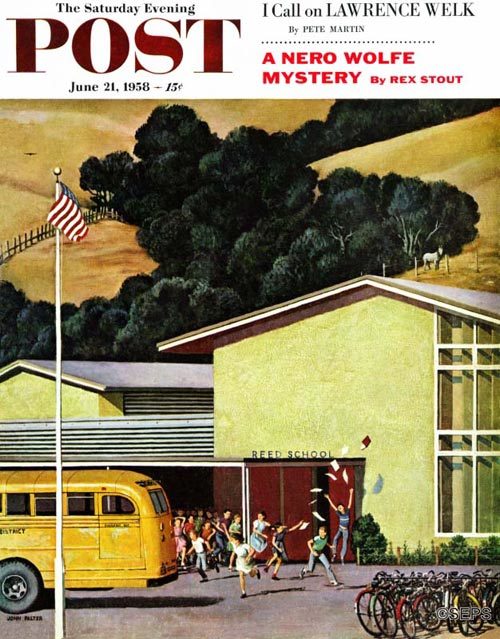
John Falter
June 21, 1958
I love the composition John Falter has here. He could have concentrated on the kids in close-up, their faces locked in big smiles. But he decided to do it from a little further away, capturing the school’s flag, the bus, and the bikes in the rack. If you look closely, you can see one of the kids throwing papers in to the air in celebration.
By the way kids, it’s already June 22. Enjoy the summer now, because you’ll be back in school before you know it!
Post Writers You Should Read
On the cover above is a Nero Wolfe story by Rex Stout, titled “Murder Is No Joke,” which was serialized in the Post in three different issues: June 21, June 28, and July 5, 1958. The story was later retitled “Frame-Up for Murder” and was part of the novella collection Death Times Three, released in 1985. You can read it for free at the Internet Archive.
After two films and several radio adaptations, there were two different TV shows based on Nero Wolfe, one a short-lived A&E series starring Maury Chaykin and Timothy Hutton and the other an even shorter-lived NBC series starring William Conrad and Lee Horsley, as well as various TV movies and pilots that never went anywhere, including one that was supposed to star Orson Welles.
Today Is National Onion Rings Day
Onion rings are a summer food, right? You can get them everywhere, but I associate them with carnivals and amusement parks, something you have along with fried dough and corn dogs and cotton candy on a stick. Something in a box you hold in your hands as you walk around the fairgrounds, looking for the next game to play or ride to ride.
They come in two distinct varieties: crunchy and wimpy. The crunchy are thick and crispy and really hold up. The ones I get in a local restaurant are thin and limp and just not the same (though they sure are tasty). Of course, you can make your own at home, too. Here are ten recipes — some with eggs in the middle and some wrapped in bacon — from the National Onion Association.
On a related note, yes, there is a National Onion Association.
Next Week’s Holidays and Events
International Body Piercing Day (June 28)
If you’ve ever wanted to pierce you body, today is the day to do it.
News of the Week: Elvis Lives, Quidditch Is Real, and Michael Bublé Doesn’t Know How to Eat Corn on the Cob
Sharknado Creators Are Making a Movie About … Elvis Presley?
The people behind the Sharknado films, along with Mark Cuban’s AXS TV network, have a new project in the works, and for some reason it involves Elvis Presley. It’s called Elvis Lives! (which is, oddly, an anagram).
Cuban says the writers and producers are “crafting a unique and original storyline that explores the well-known conspiracy theories and allows our viewers to form their own conclusions.” The producers say that they “intend to do for the life of Elvis Presley what Sharknado did for flying sharks.” In other words, Elvis Lives! is going to make the Sharknado movies look like documentaries.
By the way, the Sharknado series is still going strong. The fourth film is titled Sharknado: The 4th Awakens. It debuts July 31 on Syfy, so make a note to either watch it or avoid it.
Grab a Broom
Quidditch, the game played in the Harry Potter novels and movies, has made its way into real life.
That’s right, the game that has players flying around on brooms and trying to score goals is now a real thing. People have been playing it since 2005, and there has even been a documentary made about the game. CBS Sunday Morning did a story about the game this week, and I just can’t get past how odd it looks having adults run around a field with a broom between their legs.
Some day, The Hunger Games will be real. It will be shown live on ESPN, it’ll be sponsored by Pepsi, and we’ll all make our bracket picks every summer.
RIP Prince, Doris Roberts, and Guy Hamilton
Prince has died at the age of 57.
The words icon and genius are thrown around way too casually these days, but Prince — born Prince Rogers Nelson — was both of those things. He was an amazingly talented guy, prolific, influential. This is a true loss for music and pop culture in general. It’s hard to find a bigger name in pop music the past 30–40 years.
Prince’s body was found at his Minnesota estate yesterday. TMZ first broke the news, and it was later confirmed by his publicist. Last week, his plane made an emergency landing after he became sick after an Atlanta concert.
I don’t know what song I could post here for Prince. How do you choose? But here’s some nice guitar work from him in a 2004 “While My Guitar Gently Weeps” tribute to George Harrison:
Every year is a bad year for celebrity deaths but 2016 is turning out to be one of the worst, isn’t it?
Everybody Loves Raymond’s Marie Barone is one of the great sitcom moms, and I can’t imagine anyone else but Doris Roberts playing her. She had a conniving, nosy persona, but you also liked and understood her. That’s not always a combo that’s easy for someone to pull off. Roberts passed away this week at the age of 90.
Roberts had a big career before Everybody Loves Raymond. She played secretary Mildred Krebs on Remington Steele and was a regular on shows like Angie, Maggie, and The Boys. She also appeared in a million other TV series and movies — too many to list — starting with a CBS show called Starlight Theatre in 1951.
Ray Romano released a statement about Roberts, and co-stars Patricia Heaton and Brad Garrett spoke out via Twitter:
To my beloved Marie – RIP. pic.twitter.com/TtZCySQnLK
— Patricia Heaton (@PatriciaHeaton) April 18, 2016
Thank you, Ma. Miss you. Love, Robbie (photo by @TomCaltabiano ) pic.twitter.com/XuiRl79xkW
— Brad Garrett (@RealBradGarrett) April 20, 2016
Guy Hamilton also passed away this week. He directed what many consider one of the best James Bond movies, Goldfinger, as well as Diamonds Are Forever, Live and Let Die, and The Man With the Golden Gun. Beyond Bond, he also directed Remo Williams, Funeral in Berlin, Battle of Britain, The Mirror Crack’d, and many other films. Hamilton was 93.
Michael Strahan Now Down to Just One Morning Show
I haven’t watched Live with Kelly & Michael at all since Regis Philbin left the show (and it was called Live with Regis & Kelly, because having Michael in the title wouldn’t have made any sense). I tuned in because I like Philbin, and the young/old contrast between the two was always a source of amusement. But now that Kelly Ripa is in charge and there’s an ex-football player/current NFL analyst as a co-host, I don’t find anything interesting about it.
But this week, Michael Strahan announced that he’s leaving the show this September after four years. He’s going to be on Good Morning, America full-time now, as a co-host.
And if we’re to believe the behind-the-scenes goings-on, Ripa was “blindsided” by the news and she was “beyond angry” because Disney and ABC didn’t tell her in advance. Supposedly she’s so angry she decided to take off the rest of the week from the show without any explanation. Ana Gasteyer sat in for Ripa on Wednesday, and Erin Andrews filled in yesterday and today. Ripa will also be gone from the show this Monday, though Friday and Monday are part of a planned-in-advance vacation.
Now the search for a new co-host begins. Who could it be? Anderson Cooper is always great when he fills in, but he probably wouldn’t want to leave his CNN/60 Minutes gigs. But Reege is available!
Goodbye Andrew, Hello Harriet
Harriet Tubman is going to replace Andrew Jackson on the $20 bill. Treasury Secretary Jacob J. Lew made the announcement this week, adding that other women and people of color will appear on bills starting in 2020. Tubman was chosen because she helped free thousands of slaves via the Underground Railroad (and her spy work!).
Of course, they can’t make this move without causing some controversy. Tubman will be on the front, but there will still be a picture of Jackson on the back. I’m sure there will be protests over the fact that they couldn’t give the entire bill over to her.
As for Alexander Hamilton, who — spoiler alert! — was shot and killed by Aaron Burr, he’s staying on the $10 bill. Lew had planned to replace Hamilton but decided to put a woman on the $20 instead. Part of the reason he’s staying on? You can thank the success of the Hamilton musical, (which is now a Pulitzer Prize winner).
Somewhere in Hollywood right now, someone is creating a TV series where Alexander Hamilton and Harriet Tubman team up together to solve crimes.
Eating Corn on the Cob, Bublé Style
A picture of singer Michael Bublé eating corn on the cob caused a small uproar on Twitter the past week. I have no idea why (or even how) he eats it this way, but here’s the pic:
Next time you're feeling down just remember that Michael Buble doesn't know how to eat corn pic.twitter.com/z7XufccskT
— Greg Kumparak (@Grg) April 15, 2016
Corn on the cob is not a food you eat with one hand, Michael. It’s not a corn dog or a Popsicle or a cup of coffee. Your other hand is free — use it! And put some butter on it (the corn, not your hand).
Bublé had a good response to it, though, saying the controversy was “vegetable harassment.”
Should Texting in Movie Theaters Be Allowed?
The answer? No. Hey, that was quick. Thanks for playing!
For a short time this past week, AMC Theaters CEO Adam Aron actually believed that texting should be allowed in his movie theaters because “you can’t tell a 22-year-old to turn off their cellphone.” But in one of the few instances in which social media freaking out actually did some good, AMC quickly put the kibosh on that idea. They reversed their position almost before the controversy could start trending:
NO TEXTING AT AMC. Won't happen. You spoke. We listened. Quickly, that idea has been sent to the cutting room floor. pic.twitter.com/JR0fo5megR
— AMC Theatres (@AMCTheatres) April 15, 2016
Maybe they realized that doing something that would make people stay home with their deluxe home theater setups and stay away from AMC wasn’t the best business strategy.
Look, we could sit here and discuss all the reasons texting (and cellphone use in general) shouldn’t be allowed in places like movie theaters and churches. The light from the phone, the ringing, the talking. But here’s another reason: Can’t you go two hours without checking your phone? Remember when going to a movie theater was for escapism, to bond with fellow moviegoers for a while? Unless you’re on the waiting list for a kidney, maybe you can just shut the phone off and enjoy the film.
How to Eat Spaghetti
Here’s some more how-to-eat-something news, this time involving spaghetti. I agree with the conclusion of this Time article, but I don’t think they had to title it “You’ve Been Eating Spaghetti Wrong This Whole Time.” Hey Time, how do you know how I’ve been eating spaghetti this whole time?
But as I said, I agree with the conclusion, which Time explains was first proposed in a 1942 article in Life. As an Italian, I’ve always twirled my spaghetti with a fork. It’s easier, it’s convenient, and you’re less prone to see the pasta fall off the fork. I’ve seen people twirl it right on the plate, which isn’t as smooth a process as using a spoon. I’ve even seen people cut up their spaghetti with a fork and knife. You can even buy “cut spaghetti” now in supermarkets. It’s great for many pasta dishes, but if it’s all cut up, it’s no longer spaghetti, is it? So just grab that fork and spoon and do it that way.
I don’t even want to know how Michael Bublé eats spaghetti. The horror …
Upcoming Events and Anniversaries
Tehran rescue attempt fails (April 24, 1980)
The mission, code named Operation Eagle Claw, was aborted after helicopters failed. One of the copters crashed, killing eight servicemen.
Hubble Space Telescope put in orbit (April 25, 1990)
After an early problem with an improperly designed mirror, the telescope has taken some incredible photos of faraway places.
Robinson Crusoe published (April 25, 1719)
You can read Daniel Defoe’s classic novel, which is sometimes called The Life and Adventures of Robinson Crusoe, for free at Project Gutenberg.
John Wilkes Booth dies (April 26, 1865)
SEP Archive Director Jeff Nilsson has the interesting and bizarre story of what might have happened to Booth’s body after his death.
Sultana explodes on the Mississippi (April 27, 1865)
Over 1,700 passengers and crew died, making it the biggest maritime disaster in U.S. history.
L.A. riots start (April 29, 1992)
The riots that started in South Central Los Angeles and spread to other areas came in the wake of the not guilty verdict in the Rodney King case.
Adolf Hitler dies (April 30, 1945)
The dictator and Eva Braun got married the day before both committed suicide.
Elvis Presley: Still Making Waves
For someone whom Forbes magazine recently cited as “one of the 20th century’s biggest cultural forces,” Elvis Presley appeared sporadically in The Saturday Evening Post during his brief lifetime.
A quick glance in the Post Archives shows the fledgling King of Rock ‘n’ Roll as the subject, at least partially, of seven articles, beginning with Pete Martin’s “I Call on Bing Crosby” interview in the May 11, 1957, issue and concluding with “There’ll Always Be an Elvis” by C. Robert Jennings on September 11, 1965.
About halfway through the Bing Crosby article, pals Martin and Crosby got on the subject of those crazy teenagers and their awful music (at least according to Martin). When Martin tries to get Crosby to agree with him, Crosby—much to his friend’s (and probably his fans’) chagrin—doesn’t take the bait. “He sings in tune and he’s got good rhythm,” Crosby says of Presley. In Martin’s “I Call on Dick Clark” interview from 1959, interviewer and interviewee locked horns over the merits of both Presley and the entire genre in which he is considered the king. “Personally, I think [Elvis is] handsome and has nice features,” Clark is quoted. “He is quiet, well spoken and fairly intelligent.”
Presley is also mentioned in a June 1960 article called “Big Gamble on the Stars,” about the insurance policies movie studios took out on their stars; when Elvis broke a tooth on the set of 1957’s Jailhouse Rock, his studio collected nearly $3,000. And in October 1963’s “Pop Music: The Dumb Sound,” his name makes a one-sentence cameo when his latest hit (“[You’re the] Devil in Disguise”) gets lumped alongside tunes and artists the author considers amateurish.
It took William Saroyan, writer and fellow rebel (notorious for winning—and refusing—a Pulitzer Prize when Elvis was just a five-year-old in Tupelo, Miss.), to capture the true spirit of the man, and his music, in a Post essay entitled “It’s Me, O Lord” (April 18, 1964). Nearly ten years have passed since Presley’s first Sun Records single came out, and Saroyan—by now living as an expatriate—finds himself one morning sitting in a bar nursing a brandy. Suddenly, someone plays “Are You Lonesome Tonight?” on the jukebox:
“The singer was Elvis Presley, one of the greatest of the singers, although much-maligned. After singing the first verse, Elvis Presley does something like a recitative, … and one of the things he says to this girl is, ‘Honey, you lied.’ Elvis Presley says these few words, these banal and unacceptable words, with so much earnestness, so much astonishment, pain, honesty, and art that the words are suddenly not banal at all, but magnificent, and not unacceptable, but welcome. He says them … as if he is talking to the verities, the enormities, the unverifiable verities, and the very probably terribly small enormities. And so I had to have the jukebox play the song six more times before I was willing to say good night and go on down the hill to my ice-cold house in Paris.”
As of mid-2008, the Library of Congress’ online catalog listed more than 600 “hits” (books, films, recordings, and so on) dedicated to Elvis Presley. Of those “hits,” Elvis, The Last 24 Hours by Albert Goldman (1991) makes a compelling case that Presley killed himself in 1977, partly because of his finances (he seriously considered filing for bankruptcy) but also because of health problems due in no small measure to his prodigious drug-taking and eating habits. A damning book was just published about him, and he was facing an upcoming concert tour, forced to perform in increasingly backwater areas of the country for significantly lower fees.
But thirty years later, the King’s legacy reigns restored and intact. Annually, thousands of fans flock to Graceland, and Presley, according to Forbes magazine, hit a high note as the top-earning deceased celebrity in 2007, raking in $49 million. Despite the entertainer’s often-turbulent life, the world continues to cherish his music and celebrated moments.
